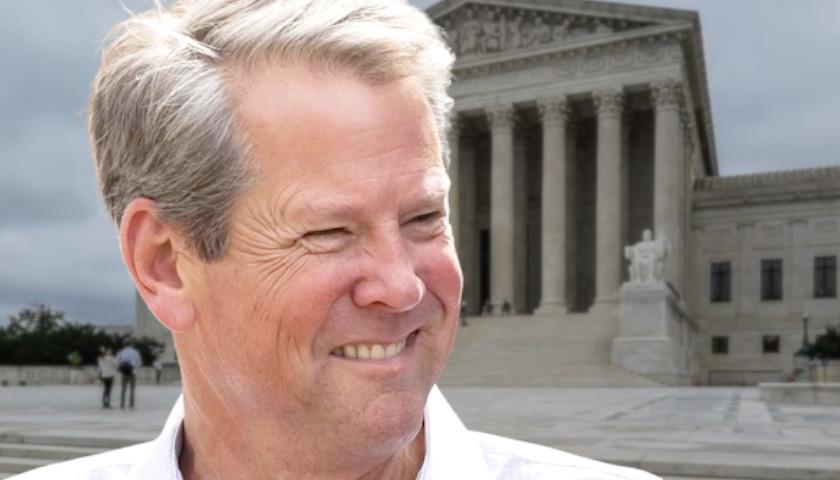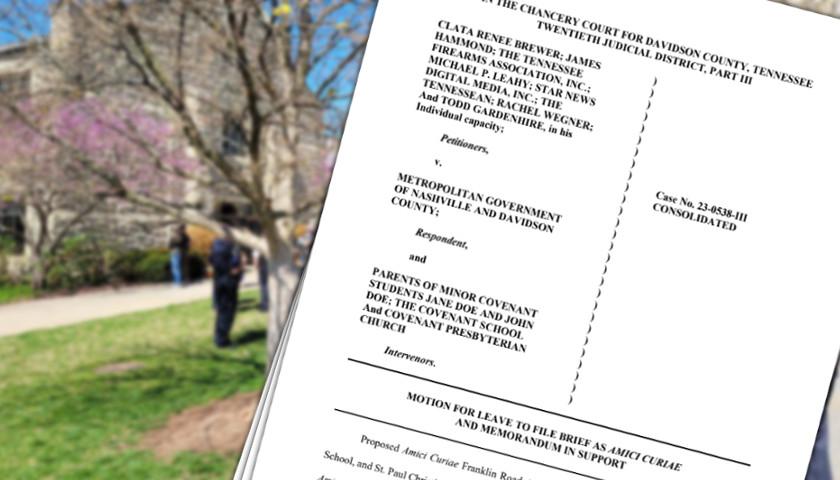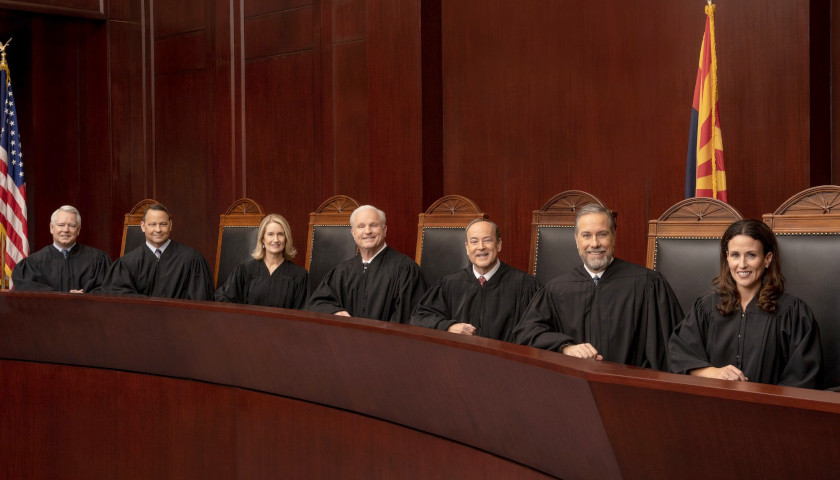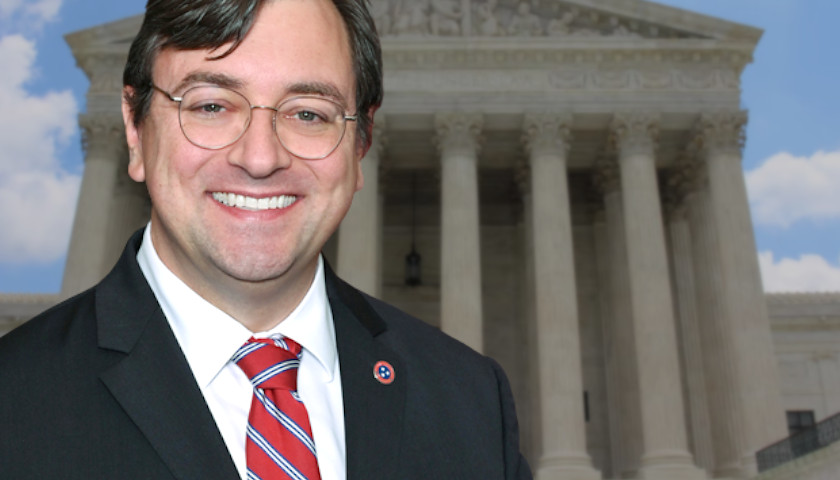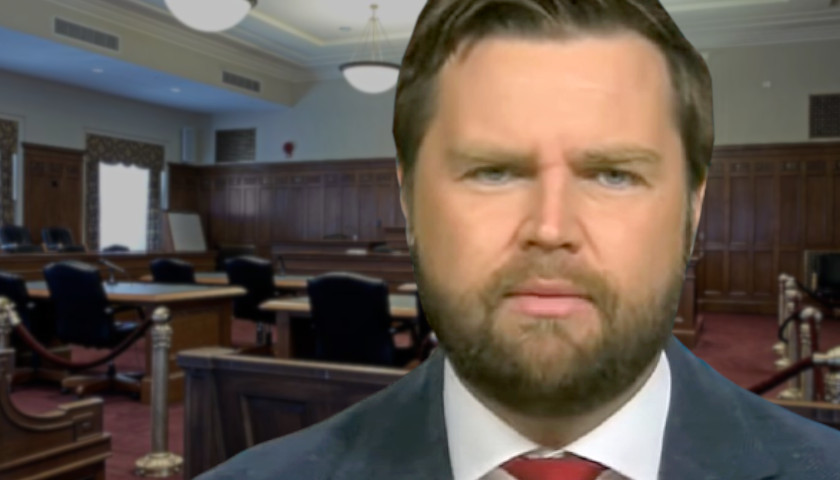Tennessee Attorney General Jonathan Skrmetti has joined a coalition of 22 state attorneys general in filing an amicus brief at the U.S. Court of Appeals for the Fifth Circuit in support of Texas’s illegal alien removal law, SB4, being challenged in the case United States v. Texas.
Read the full storyTag: amicus brief
18-State Coalition Backs Tennessee in Anti-Drag Law Ruling Appeal
Eighteen states have joined to file an amicus brief supporting Tennessee in its appeal of a ruling on its drag show law.
The amicus brief comes as Tennessee is appealing a ruling against the law to the U.S. Sixth Circuit Court of Appeals.
Read the full storyGeorgia Gov. Kemp Files Supreme Court Amicus Brief in Chevron Case
Georgia Gov. Brian Kemp has filed an amicus brief in a highly visible U.S. Supreme Court case that could overturn a standing practice that gives federal agencies the power to interpret statutes.
Kemp, a Republican, filed his brief in the case of Loper Bright Enterprises v. Raimondo, which seeks to overturn the so-called Chevron deference established by the 1984 decision in Chevron U.S.A., Inc. v. Natural Resources Defense Council, Inc. It compels federal judges to defer to federal agencies’ interpretations in “ambiguous situations” as long as the interpretation is “reasonable.”
Read the full storyMcCabe Lays Out the Events Leading Up to the Stunning Implosion of Hunter Biden’s ‘Sweetheart’ Plea Deal
One America News’ national political correspondent Neil W. McCabe joined The Tennessee Star Report Wednesday morning to break down the very latest twists and turns on the bizarre developments surrounding the Hunter Biden and the attempt by someone to “disappear” a friend-of-the-court brief that hours later, gave the Delaware court pause on accepting the First Son’s sweetheart plea deal.
Read the full storyPrivate Schools Seek to Argue Against Release of Records in Covenant Killer Manifesto Lawsuit
Four Nashville private schools are seeking entry into a nationally watched public records lawsuit that demands the release of the Covenant School killer’s manifesto and related documents.
Attorneys for Franklin Road Academy, Montgomery Bell Academy, Oak Hill School, and St. Paul Christian Academy filed a motion on Monday asking Davidson County Chancellor I’Ashea Myles for permission to file an amicus — friend of the court — brief in the lawsuit.
Read the full storyArizona’s Pre-Roe Abortion Law Receives National Support from 17 States
A coalition of 17 states, led by Arkansas, is among the entities which recently asked the Arizona Supreme Court to reverse a ruling barring Arizona’s territorial-era law restricting abortions from being enforced.
The current abortion struggle in the state surrounds Arizona Revised Statute (ARS) § 13-3603, the pre-roe law which states that no person is allowed to provide a pregnant woman with an abortion unless it is necessary to save the mother’s life and ARS § 36-2322, which was enacted in 2022 and prohibits the procedure after 15 weeks of pregnancy. The Arizona Court of Appeals previously ruled that the 15-week ban takes priority over the previous law to avoid any confusion for medical professionals. Therefore, abortion is currently legal in Arizona for a brief window of pregnancy.
Read the full storyCenter for Arizona Policy Calls for State Supreme Court to Reinstate Arizona’s Pre-Roe Abortion Limitations
The Arizona Center for Policy (CAP) shared Wednesday that it has entered the legal battle surrounding Arizona’s territorial-era limitations on abortions with an amicus brief to the state Supreme Court.
“State lawmakers kept the state’s pre-Roe law on the books as they passed dozens of laws protecting life while Roe forbade them from going further,” said CAP President Cathi Herrod. “Allowing the lower court ruling to stand threatens thousands of lives a year, as well as the integrity of the judiciary, and the Legislature’s power to govern.”
Read the full storyNational Right to Work Foundation Files Amicus Brief in Michigan Union Lawsuit
The National Right to Work Foundation filed an amicus brief at the Michigan Supreme Court opposing a strategy used by a Michigan union.
The brief, filed Friday, says the union officials of the Technical, Professional, and Officeworkers Association of Michigan “weaponizes” the grievance process to force nonmember public employees to pay fees to the union.
Read the full storyGoldwater Institute Joins in Legal Contest Against an Arizona School District’s Alleged Religious Discrimination
The Arizona-based Goldwater Institute (GI) joined in the legal battle between Arizona Christian University (ACU) and the Washington Elementary School District (WESD), arguing that ACU was discriminated against based on its religious beliefs.
“A private organization like ACU should be free to espouse its beliefs without fear of retaliation from the government. And K-12 students should not have to go without teachers simply because their school board refuses to hire qualified candidates based on those candidates’ perceived personal beliefs and convictions,” according to the GI.
Read the full storyGoldwater Institute Reacts to Arizona Supreme Court Decision That Respects Due Process
The Arizona Supreme Court released an opinion in the Legacy Foundation (Legacy) v. Clean Elections Commission (CEC) Thursday, which the Goldwater Institute (GI) celebrated as a victory for checks and balances.
“State bureaucrats cannot simply decide the reach of their own authority,” said GI Vice President of Legal Affairs Timothy Sandefur. “When bureaucrats—who are often not answerable to voters at all—have the power to make the rules, investigate infractions, and punish people for violating those rules, that authority can undermine our most important constitutional values and threaten individual rights.”
Read the full storyTennessee Senators Push Back Against the Biden Administration’s Student Loan Forgiveness Program
Tennessee Senators Marsha Blackburn (R-TN) and Bill Hagerty (R-TN) joined a group of Senate Republicans in filing an amicus brief to the Supreme Court pushing back on the Biden Administration’s student loan debt relief program.
Read the full storySoutheastern Legal Foundation Litigation Director Braden Boucek Weighs in on AG Skrmetti’s Veteran Affairs Amicus Brief
Friday morning on The Tennessee Star Report, host Leahy welcomed attorney Braden Boucek of the Southeastern Legal Foundation in studio to weigh in on Tennessee AG Jonathan Skrmetti’s recently filed amicus brief with the Department of Veteran Affairs.
Read the full storyTennessee Attorney General Skrmetti Files Amicus Brief Against the Department of Veterans Affairs New Abortion Rule
Tennessee Attorney General Jonathan Skrmetti joined a coalition of 17 attorneys general in filing an amicus brief in the Western District of Texas in the case of Carter v. McDonough.
Read the full storyAG Jonathan Skrmetti Explains the Context and Path of Gonzalez v. Google Bi-Partisan Amicus Brief
Tuesday morning on The Tennessee Star Report, host Leahy welcomed Tennessee Attorney General Jonathan Skrmetti to the newsmaker line to discuss his recently filed amicus brief and the path forward for the consumer protection case of Gonzalez v. Google.
Read the full storyTennessee AG Skrmetti Takes Aim at Big Tech’s Section 230 Protections
Tennessee Attorney General Jonathan Skrmetti announced Tuesday that he has led a coalition of 25 States and the District of Columbia in filing an amicus brief at the United States Supreme Court in Gonzalez v. Google.
Read the full storyMark Brnovich Files Brief Urging Supreme Court to Protect Consumers in Class Action Settlements
Arizona Attorney General Mark Brnovich (R) recently led a coalition of 20 state attorneys general in filing an amicus brief urging the Supreme Court of the United States (SCOTUS) to protect the rights of consumers in class action settlements.
“Class action settlements should benefit people who have been harmed and not just the attorneys,” Brnovich said in a press release. “That’s why we are asking the court to ensure consumer interests are being faithfully represented.”
Read the full storyMichigan Attorney General Nessel Joins Amicus Brief over Family Planning Funding Lawsuit
Michigan Attorney General Dana Nessel joined a coalition of 23 attorneys general in an amicus brief seeking to restore federal funding for family planning services.
Led by New York and California, the lawyers filed an amicus brief in the U.S. Court of Appeals for the Sixth Circuit, supporting the efforts of President Joe Biden’s administration to restore Title X funding to providers that left the program under restrictions enacted in 2019.
Read the full storyNew York Attorney General Letitia James and 22 Attorneys General Fight Arizona’s Law to Ban Abortions Based on Fetal Abnormalities Like Down Syndrome
This past year, the Arizona Legislature passed a law banning the abortion of babies for reasons of genetic abnormalities such as Down Syndrome, but a federal judge who was appointed by President Barack Obama halted it from going into effect due to a legal challenge. Democratic New York Attorney General Letitia James and 22 other attorneys general jumped into the litigation, filing an amicus brief supporting the challenge to SB 1497, which is also known as the “Reason Ban.”
James stated, “Arizona is just the latest in the long line of conservative-led states that are seeking to impose their will on millions of women with laws that aim to control our bodies, our choices, and our freedoms, but we will never stop fighting them. We’re asking the appeals court to uphold the lower court’s decision and strike down this unconstitutional law.”
Read the full storyU.S. Senate Candidate Vance Signs onto Ohio’s Big Tech Lawsuit
An Ohio U.S. Senate candidate and attorney has signed onto a lawsuit in support of the state’s bid to regulate Google like a public utility.
JD Vance is part of the Claremont Institute, which filed an amicus brief supporting Attorney General Dave Yost’s June lawsuit against the Silicon Valley giant.
Read the full storyArizona Attorney General Brnovich Files Amicus Brief in Supreme Court 2nd Amendment Case
Arizona Attorney General Mark Brnovich joined 26 other states to submit an amicus brief to the U.S. Supreme Court in support of a lawsuit seeking to expand 2nd Amendment rights.
The case, New York State Rifle & Pistol Association, Inc v. Kevin P. Bruen, is challenging current laws and regulations of New York State’s concealed carry requirements.
Read the full story106 GOP Members, Including Five from Tennessee, Soon to be Six, File Amicus Brief in Texas SCOTUS Election Lawsuit
A total of 106 House Republicans on Thursday filed an amicus brief with the U.S. Supreme Court in support of the plaintiffs in Texas v. Pennsylvania, et al, including Tennessee’s U.S. Representatives Mark Green, Tim Burchett, Chuck Fleischmann, David Kustoff, John Rose, with U.S. Rep. Mike Johnson (R-LA-04) taking the lead.
U.S. Rep. Mark Green (R-TN-07) tweeted, “100+ House Republicans and I have filed a brief urging the Supreme Court to hear the Texas case. The election for the presidency of the United States is too important to not get right.”
Read the full storyEducational Choice, Minority Advocacy Groups Ask Tennessee Supreme Court to Implement ESA Program
A trio of organizations filed an amicus brief in the Tennessee Supreme Court asking justices to accept an appeal of a lawsuit over the educational savings account (ESA).
The American Federation for Children joined Latinos for Tennessee and the Memphis Chapter of the Southern Christian Leadership Conference in the filing. The AFC is an affiliate of the the Alliance for School Choice.
Read the full storyDave Yost Joins Other State Attorneys General in Supporting States’ Rights to Regulate Drug Prices
Ohio Attorney General Dave Yost joined a bipartisan coalition this week that supports states’ rights to regulate prescription drug prices.
Read the full storySen. Blackburn Leads Amicus Brief Supporting Christian Florist Targeted for Religious Beliefs
U.S. Sen. Marsha Blackburn (R-TN) is leading over 40 members of Congress in an amicus brief in support of Barronelle Stutzman, the owner of Arlene’s Flowers in Richland, Washington.
Read the full storyTennessee Firearms Association Files Supreme Court Amicus Brief
The Tennessee Firearms Association (TFA) has filed an Amicus Curiae (Friend of the Court) brief with the U.S. Supreme Court in the matter of Jeremy Kettler v. U.S. urging the Court to hear the case on appeal from the 10th Circuit Court of Appeals. The brief was filed on Feb. 19, 2019, along with the Downsize DC Foundation and the Heller Foundation. Mr. Kettler, a military veteran, has war-induced hearing damage. He bought a suppressor (inaccurately called a silencer in some news reports) to protect his hearing during target practice with his lawfully owned weapons. He purchased the suppressor under the Kansas Second Amendment Protect Act (Kansas Act). The Kansas law protects guns and gun accessories from federal regulation if they were manufactured entirely within the state of Kansas and then sold in Kansas. The suppressor purchased by Mr. Kettler met both provisions of the law. (Tennessee and eight other states have enacted similar laws.) Subsequently, The Bureau of Alcohol, Tobacco, Firearms, and Explosives (BATFE) arrested Kettler and ultimately charged him with and a federal jury convicted him of a felony for possessing an unregistered firearm. The Tenth Circuit Court of Appeals upheld the conviction, ruling in part that ONLY…
Read the full storyTrump Administration Urges Supreme Court To Protect Cross-Shaped War Memorial
by Kevin Daley The Trump administration filed an amicus (or “friend of the court”) brief Wednesday urging the Supreme Court to protect a 93-year-old war memorial in Bladensburg, Maryland, that is shaped like a Latin cross. The court will soon decide whether the cross-shaped World War I memorial violates the First Amendment’s ban on religious favoritism. The justices agreed to take the case on Nov. 3. [ Read the Trump administration’s brief to the Supreme Court ] The Trump administration’s brief emphasizes the need for the high court to clarify its jurisprudence concerning religious displays in the public square. Since 2005 the justices applied two different tests for assessing the constitutionality of sectarian symbols in public settings. Confusion has followed in lower federal courts as to which test should govern the so-called public display cases. That uncertainty, the government says, “encourages challenges to longstanding displays like the Memorial Cross, which in turn fosters the very religion-based divisiveness that the establishment clause seeks to avoid.” “Cases like these cannot help but divide those with sincerely held beliefs on both sides,” the brief reads. “This case presents an opportunity for the Court to adopt a standard for establishment clause challenges to…
Read the full story


